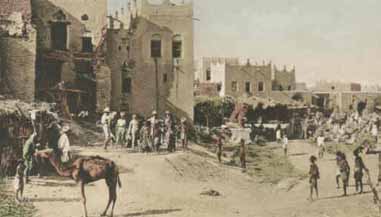Market in Lahj, southern Yemen
[Note: Arthur John Byng Wavell (1882-1916) was a British soldier and adventurer who traveled in disguise to Mecca in 1908 and went on to Yemen in 1911 to witness fighting between the Zaydi imam’s troops and the Ottoman Turks. This account was originally published in 1912.]
The events in that country [Yemen] are worthy of a chapter in the history of these prosaic days. The counter-currents of human interest and activity that run up and down the Red Sea, linking the civilizations of the East and West, leave undisturbed this backwater. Western Europe knows little and cares less about what goes on there.
Yet for the last twenty years, while the Turks and Arabs have been struggling for the mastery, the history of the Yemen has been one of fire and sword. It is a record of battles and sieges, places taken by storm and garrisons starved into surrender; of savage massacres and fierce reprisals. Generals have made and lost great military reputations there. The campaign of 1911, with which this book deals, probably cost nearly as many lives as did the Boer War. Nor is this conflict over; it will be renewed and fought out to the end, for both sides mean to win.
Little more than bare references to these happenings have appeared in the newspapers. No war correspondents go up with the Turkish armies; there are no foreign attachés to tell their countrymen what they see. The Turks are quite satisfied that the world should remain in ignorance of what is happening; they ask nothing better than to be left alone. It is by virtue of being the only Englishman to witness the fighting in the Yemen that I have ventured to write this account of it…
In 1872 Mukhtar Pasha invaded the Yemen highlands and captured Sanaa. The Imam, though retained as a figure head, was pensioned off by the Turks and deprived of all real power. Like his immediate predecessors he was a weal degenerate, and the country under his rule had fallen into a state of misgovernment little removed from anarchy.
The first results of the Turkish occupation were therefore beneficial, and it was generally welcomed for that reason. Not many years elapsed however before Turkish methods in their turn began to cause discontent. The Arabs dislike being treated as a “subject race”; they dislike paying taxes, and still more do they dislike the Turkish way of collecting them; they dislike the Turk for his manners, his laws, his religion, his clothes, and his personal appearance: in fact they dislike pretty well everything connected with him…
The rebellion that broke out in 1891 attained at first a large measure of success. Sanaa was closely besieged for several months, and only relieved after severe fighting. Several less important Turkish garrisons had to capitulate. An army sent from Europe under Ahmed Feizi Pasha succeeded in restoring tranquility after an arduous and costly campaign.
Peace, however, did not last long. sporadic outbreaks continued to occur, and in 1905 a general revolt was once more in progress. On this occasion the rebels captured Sanaa by starving the garrison into submission. More than seventy pieces of artillery, together with a great quantity of small arms, ammunition, and other warlike equipment, fell into their hands.
Once more was it necessary to send an army from Europe to vindicate Ottoman sovereignty, and once more did success reward the valour and determination of the Turkish troops. The revolt was suppressed, Sanaa was recaptured, and all the old positions reoccupied, but only at a cost in blood and money that it seems surprising that Turkey should have thought it worth while to incur. The operations, moreover, were indecisive in one way; the Imam and his followers utterly declined to surrender any of the weapons and stores they had captured, and it was only by the Turks giving way on this point that a qualified peace was eventually patched up.
This last peace was in reality little more than a truce, and would scarcely have proved as enduring as it actually did but for the events in European Turkey in the years 1908-09. The genuine enthusiasm for the new constitution, and the high hopes it at first inspired, spread to the Arabs themselves; though the cause, the probably effects, and the very nature of the movement were imperfectly understood on all sides. The feverish desire of the Turkish statesmen to secure peace at home and abroad, for a time at any rate, led them to promise the Zaidies what practically amounted to “home rule.” They asked from them time to formulate a scheme which should be satisfactory to both sides, and they gave up all attempts to collect revenue from the Arabs. Even the “octoi” method of taxation was abandoned. Such was the state of affairs in 1910.
[Excerpt from A Modern Pilgrim in Mecca and a Siege in Sanaa, by Arthur John Byng Wavell. Reading: Garnet Publishing, 2005 [1912], pp.v-vi, 199-201.]
